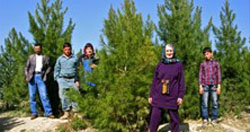Ash Wood, a Presbyterian living in Northern California, has just returned from a tree-planting trip to Afghanistan — his third since the age of 72.
“After 9/11 occurred and our government decided to go into Afghanistan, there was a lot of controversy — especially living here in San Francisco,” explained Wood — now 79 — in recounting the origins of a project now called Bare Roots.
“I was looking for something we might do at our church that could bring us together, that everyone, no matter their political leanings, could agree on and that would be positive,” Wood said.
He wanted to bridge differences while being “forward-looking.”
“We were sending our young men over there — the old guys always send the young guys to battle — and as an older man I thought, why don’t I join them?” Wood said.
A few years earlier, Wood had traveled to the Middle East with his congregation, First Presbyterian San Anselmo, and had noticed a sense of local pride in the trees and the change that tree planting had made to the topography of the area.
After a few conversations, he and six others agreed to partner in this desire to ‘plant the future’ in Afghanistan, even in the midst of the unfolding invasion.
Wood’s research led him to a reporter with background on Afghanistan who put him in touch with a local Afghan woman, Asma Eschen, who had married an American and was also living in the San Francisco Bay Area.
“We had a number of meetings over that first year, came up with a mission statement, and decided to call ourselves Bare Roots,” said Wood. He and the small group wanted to make sure that a respect for the dignity of the local people and an appreciation of their knowledge remained central in their mission.
“We wanted this to be people to people, not just the governments,” said Wood. The connection with Asma Eschen led the group to an organization called Afghans 4 Tomorrow that helped to facilitate that contact.
“They put us in contact with some village people and a woman who was head of the Women’s Department for the government,” said Wood. “When we asked what we could do, she asked us if we would be willing to plant trees in the women’s garden.”
The women’s garden, about the size of three football fields surrounded by 20-foot walls, is an area for women only, where they are free to remove their head coverings and relax, Wood said.
“They usually go there with their children,” he said. “It was absolutely bare, nothing there.”
So the group agreed to plant roses and trees—about 800 fruit and shade trees along the walls.
“I had a chance to visit on this past trip and the trees that we put in, they are 14 and 16 feet high,” Wood said. “The place is gorgeous.”
The Afghans had also asked Bare Roots to focus on an area called Maranjan Hill.
“It had been a park, but an area where the Russians had cut down the trees because they needed places for their canons to lob shells into the city (of Kabul),” said Wood.
The group planted about 2,500 pine trees on the hill that first year.
“Each one of us got a local young man to help us and I can remember working with Samir,” said Wood. Samir was 18 years old. Wood was 72. “When I asked him how old he was I said, “I think you should dig the holes and I’ll hold the trees,” recounted Wood.
As the trees are planted, the project itself has begun to grow.
The second year of Bare Roots, Wood got a call from a nursery in Los Angeles that had started a nursery in Kabul as well and had sold the group their trees the first year year.
“They said, ‘This nursery is not working out — how about if we donated 300,000 trees to you?’” said Wood. “Of course I accepted.”
“We are trying to do what we can to make the world a better spot,” he said. “Our church, we pride ourselves on two things — we work hard on mission and on music.”
Other local Presbyterians have begun to work with the initial group from FPC San Anselmo.
“As is often the case with this type of work, doing something for somebody else, we are getting more than we give,” Wood said.
Eight years and some 150,000 trees later, their efforts have certainly begun to take root.
Every $2 donated to the Bare Roots project, funded by donations, buys a tree. Checks can be made out and sent to FPC San Anselmo, noting ‘Bare Roots Project.’
Erin Dunigan is a freelance writer, photographer, and pastor who lives in a small coastal community in Baja California, Mexico when she is not following her wanderlust out into the world.

